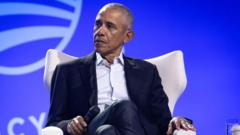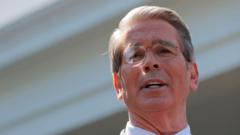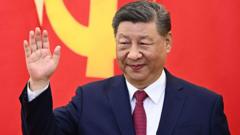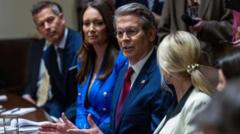After imposing heavy tariffs, President Trump faced backlash as stock markets suffered. His recent temporary relief offers insights into the need for political leaders to respond to economic distress and public pressure.**
Turmoil in the Markets: Trump's Tariff Decisions Create Economic Ripples**

Turmoil in the Markets: Trump's Tariff Decisions Create Economic Ripples**
Former President Trump's recent tariff implementations have reignited fears in global markets, prompting a reevaluation of political accountability during economic crises.**
In a month marked by economic upheaval, former President Trump’s introduction of hefty tariffs has thrown the global financial landscape into chaos. As soon as he announced these tariffs, investors reacted with panic, causing stock markets to plummet and speculation about an impending recession to take hold. Despite the dramatic fallout, Trump remained steadfast in his approach, dismissing the turbulence that resulted in trillions of dollars evaporating from investments.
However, a shift occurred when distress signals from U.S. government bond markets compelled him to reconsider. Trump’s subsequent issuance of a partial and temporary reprieve from certain tariffs—particularly on smartphones and computers—provided a momentary sense of relief in the global economy, but it also raised pressing questions about the authority of elected officials amid economic turmoil.
Political scientist Elizabeth Saunders from Columbia University elaborated on the nature of political accountability, stressing that leaders should respond not only to the electoral landscape but also to less formal pressures from various stakeholders, including advisors and business leaders. “Accountability often transcends the ballot box,” she noted, emphasizing the critical need for leaders to adapt when their policies lead to significant public and financial discontent.
This episode invites scrutiny into what mechanisms are at play that can effectively compel government leaders to amend or soften detrimental policies that threaten the fabric of the economy.






















